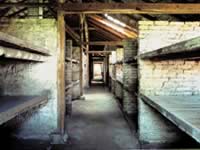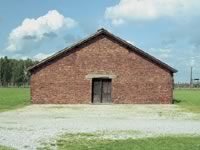 |
       |  |
|
|
|||||||||||||||
 Auschwitz Aufnahmen Anlässlich des 70. Jahrestages der Befreiung ca. 15 Ausgaben der in 2003 publizierten Arbeit sind in Russisch, Polnisch und Französisch verfügbar. Signatur, Box mit Stempel u. Signatur, 175,-€ s. a. The Photobook Vol. II, Martin Parr/Gerry Badger, Seite 244/245 Material Auschwitz-Birkenau Photoband Auszug (PDF, ~450Kb)  Deutsch Deutsch English English Français Français Polskie Polskie Русский перевод Русский перевод»Prolog« Gerhard Schoenberner  Deutsch Deutsch English English Français Français Polskie Polskie Русский перевод Русский перевод»Epilog« Stefan Skowron  Deutsch Deutsch English English Français Français Polskie Polskie Русский перевод Русский перевод»Intentions« Marceline Loridan-Ivens  Deutsch Deutsch English English Français Français Polskie Polskie Русский перевод Русский переводTexte zum Film  Treatment Treatment Synopsis Synopsis |
»Little Birch Meadow« Intentions by Marceline Loridan-Ivens This film narrates the return to Birkenau, fifty years after her liberation, of Myriam, a former prisoner, a French Jewish woman of Polish origin. I am this death camp survivor, I, Marceline Rozenberg, arrested in 1943, imprisoned in Marseilles, later in Drancy, before being transported to Auschwitz Birkenau aboard train # 71, and freed in Tieresienstadt. Of the 76,500 people transported from Drancy - among whom were 11,000 children - only 2,500 ever came back. How many are still alive?  Primo Levi wrote If This Is a Man, his first book, the very year he came back to Italy. It took me more than fourty years to start writing down - and with what difficulty! - the framework of this movie's screenplay, which does not aim at reviving the past (who could do that?) but to give their rightful importance to recollection and remembrance. Primo Levi wrote If This Is a Man, his first book, the very year he came back to Italy. It took me more than fourty years to start writing down - and with what difficulty! - the framework of this movie's screenplay, which does not aim at reviving the past (who could do that?) but to give their rightful importance to recollection and remembrance.Why so late? If I waited such a long time before contributing to the living memorial to the Shoah made of the survivors' memories, it is simply because during all this time I was not able to do it. As a person, it seemed to me, as to many other survivors, that what my testimony could express was so little compared to what had actually took place that I had better remain silent. As an artist, however, today, although I tremendously dread I might lack the capacity to do so, I know it is my duty to express myself and combine my voice with that of those who were courageous enough to speak, before the death of the last survivor definitively makes death camps into history. Or before it makes it forgotten.  Why a fictional film? My language, my way to express myself, after thirty years of close collaboration with Joris Ivens, is cinema. With Joris, I explored many ways of the documentary film. Until his last film, our common work, Une Histoire de vent, in which we blew the border between document and fiction, reality and fantasy: the »report« on the old movie-maker trying to achieve the impossible: shooting the wind on film, turns into a tale in which the breath of life and the epic of history are fused into one universal cosmic principle. In La Petite prairie aux bouleaux, I need the splitting between the movie-maker, who narrates her own progress, and the actress who embodies and expresses her, a splitting that is only possible in fiction. I want her to express the emotions and thoughts which the ruins of Birkenau inspired in me the first time I went back there. Why a fictional film? My language, my way to express myself, after thirty years of close collaboration with Joris Ivens, is cinema. With Joris, I explored many ways of the documentary film. Until his last film, our common work, Une Histoire de vent, in which we blew the border between document and fiction, reality and fantasy: the »report« on the old movie-maker trying to achieve the impossible: shooting the wind on film, turns into a tale in which the breath of life and the epic of history are fused into one universal cosmic principle. In La Petite prairie aux bouleaux, I need the splitting between the movie-maker, who narrates her own progress, and the actress who embodies and expresses her, a splitting that is only possible in fiction. I want her to express the emotions and thoughts which the ruins of Birkenau inspired in me the first time I went back there.There are three main characters in this film: Myriam, the survivor, looking for an unbearable and unspeakable memory, Oskar, the young German photographer, sincerely and entirely devoted to his mission of remembrance and Birkenau with its barbed wires, its barracks, its miradors and its trees - birches - which grew near the memory-laden ruins of gas chambers and crematoriums... The first two characters question the third. Maybe the topic of the film is the confrontation of their outlooks and their visions, between the past, present and future, at once irreducibly different and the bearers of a both tiny and infinite hope. Soon, no-one will be able to look at Birkenau, or the remains of any other World War 2 death camp, with Myriam's eyes. What then will the future generations' vision of them be? |
|||||||||||||||
| aktuelles andreas magdanz arbeiten neue projekte magbooks presse lehre kontakt impressum | english | ||


